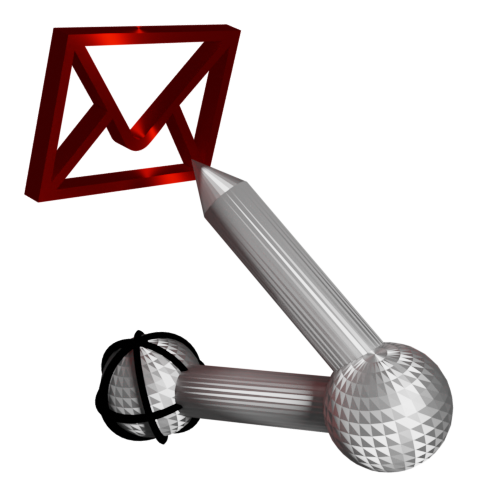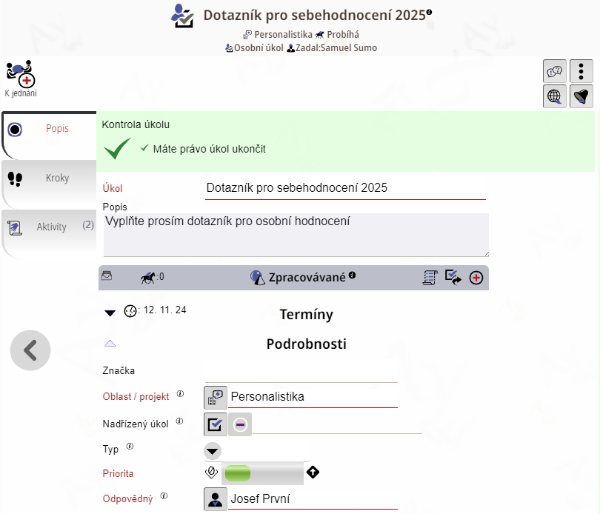AyMINE – Technical documentation
Modules
 Task, project & quality management
Task, project & quality management
Manager approval with the task report
Why some data can't be deleted
Adminitration of areas, projects, calendars
Region / project / methodology
Change management process in a project
GDPR and record of qualifications
Qualification of user or contact
Right to Manage Qualifications
Failure Analysis for an Individual Property of a Component or Process
FMEA – Probability of Detection
FMEA – Probability of Occurrence
 Task, project & quality management
Task, project & quality management
Administration of the Task Management Module
System rights for the task management module
Improvements and Preventive Measures
Methodology and Quality Management systems
What a methodology / QMS consists of
Problems, tickets and their management
Collaborative Resolution of Multiple Problems
Customer Service Response Generation
Incident and Quality Issue Management
Objects affected by the problem
Problems, Incidents, Helpdesk Tickets
Return project plan by baseline
Sample tasks and methodologies of the area
Effect of the task on the right to modify the attached object
The person responsible for the task
Working procedure – task definition
Objects related to the task pattern
 Contacts and directories module (CRM)
Contacts and directories module (CRM)
Order overview for customer groups
 Contacts and directories module (CRM)
Contacts and directories module (CRM)
System Permissions and CRM Module Settings
Send bulk messages in compliance with GDPR
How to correctly forget a person's details
Unsubscribe and set preferences
for bulk mail
 Web management and automation
Web management and automation
Receiving a message from the web
Human resources
Personalistics – User Permissions
Human Resources module security
Manage department / division data
Overview of Personnel Information for pracov# Employment Contract
Synchronizing staff and system users
 Products, assets and sales
Products, assets and sales
Received order for goods or services
Finance management
Metrics and Measurements
Technical Modules
Sabre plugin module
Enterprise Architect connector
Database link to Enterprise Architect database
Enterprise Architect connector
System Modules
 The AyMINE Framework Module
The AyMINE Framework Module
AyMINE — Tips for Mobile Usage
Configure how your system looks and works
Gestures and Keyboard Shortcuts
More about how the system works
Private notes and tags for objects
Overview of Modules and Record Types
Filtering in the list of records
 System Management
System Management
Additional functions with files
Copying and moving files between objects
Files (documents) linked to the object
Formatted texts in the application
Gateway settings for external messages
IMP gateway settings for email communication
Internet Call Gateway Settings
Message with the outside world
 Personal Task
Personal Task 
A personal task is a task that concerns only you
- What makes a personal task and a team task different
- Specific properties of the personal task
- Who can see personal tasks
- Why personal tasks are useful
- Why the task is visible to the direct supervisor
- Assign personal tasks correctly
- Good to know
A personal task is an alternative to a general task, which, unlike a personal task, is in principle a group task
What makes a personal task and a team task different
What makes a team task extra
- For a task, it is possible to define a team of people who work together
- Team tasks can be passed between people on the team.
- A task can be delegated to someone else – for a task, it is independently monitored who is responsible for it and who is performing it
Specific properties of the personal task
Personal task
- Not transferable to anyone
- Not publicly visible
A personal task is more private – it is not seen by colleagues, only by the manager, It is thus possible to enter a task easily that no one else should know about. An example of this is tasks related to personnel matters.
Personal tasks can be planned for a specific time within the day. Team tasks are planned for days, but a personal task can also be scheduled for a specific hour.
No files are attached to a personal task. If you add a file to a task, it is automatically assigned to the object that is processing it. For example, if a task is related to an order, the uploaded file will be stored with the order. This makes it easier to store files where they are supposed to be.
Who can see personal tasks
Your personal tasks are only visible to your direct supervisor or whoever else gave you the task. In addition, your supervisor cannot see the details of the assignment unless he or she has given it to you.
Example: If you receive a personal task from a recruiter (e.g. a reference for a new job applicant), your supervisor and the recruiter who gave you the task can see the task. No one else will know about the assignment.

Why personal tasks are useful
Common tasks are generally always visible to the entire team you work with. For example, a problem-solving task you receive in the quality department is visible to the entire quality department. This makes it easier for you to collaborate on the task, or someone can take over the task when you can't attend to it.
On the other hand, only you can accomplish and complete a personal task. It is advisable to keep tasks in the field of HR, preparation of new strategies, business meetings, etc. private.
Why the task is visible to the direct supervisor
Your direct supervisor is responsible for the efficient use of your time and needs to know what you are working on. Even if someone else gives you the task, your line manager needs to know what you are working on. However, they do not need to know the details of the task. Therefore, he/she does not see a steps tab in the task with details.

Assign personal tasks correctly
As a supervisor, you should know:
- Personal tasks are only good for tasks where it is important that the team does not know about them. Remember that if you give someone a personal task, they cannot pass it on to anyone else, and neither can you delegate the task to someone else.
- You cannot collaborate on a personal task. Don't assign activities as a personal task that more than one person should work on. If such a situation arises, you must assign each person individually. If this is the case on a regular basis, consider creating an area in which to assign such tasks so that they can be collaborated on within the area
- Write the details of the task in the points section, which remains hidden
Good to know
What about visibility of tasks
A team task is more "public", but this certainly does not mean that everyone knows about it.
Every task is in a project or area. For team tasks, it is always the case that everyone who is an active employee – that is, members of a project or organizational team – knows about the tasks. A team task cannot be hidden from a group, but no one outside of that group will know about it.
Specifically, for example, team tasks in personnel are seen among themselves by personnel personnel, but no one who does not work in the personnel department (and therefore does not have access to the field of personnel) will know about them.
And what about a personal task
For a personal task, it depends on its setting. It can be
- Visible as well as team tasks
- Visible only to senior employees
- Completely secret – visible only to a self-created employee.